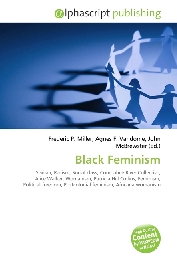Detailansicht
Black Feminism
Sexism, Racism, Social class, Combahee River Collective, Alice Walker, Womanism, Patricia Hill Collins, Feminism, Political freedom, Postcolonial feminism, Africana womanism
ISBN/EAN: 9786130226190
Umbreit-Nr.: 1260674
Sprache:
Englisch
Umfang: 128 S.
Format in cm: 0.7 x 22 x 15
Einband:
kartoniertes Buch
Erschienen am 29.11.2009
Auflage: 1/2009
- Zusatztext
- Black feminism argues that sexism, class oppression, and racism are inextricably bound together. Forms of feminism that strive to overcome sexism and class oppression but ignore race can discriminate against many people, including women, through racial bias. The Combahee River Collective argued in 1974 that the liberation of black women entails freedom for all people, since it would require the end of racism, sexism, and class oppression. One of the theories that evolved out of this movement was Alice Walker's Womanism. Alice Walker and other Womanists pointed out that black women experienced a different and more intense kind of oppression from that of white women. They point to the emergence Black feminism after earlier movements led by white middle-class women which they regard as having largely ignored oppression based on race and class. Patricia Hill-Collins defined Black feminism, in Black Feminist Thought (1991), as including "women who theorize the experiences and ideas shared by ordinary black women that provide a unique angle of vision on self, community, and society".
